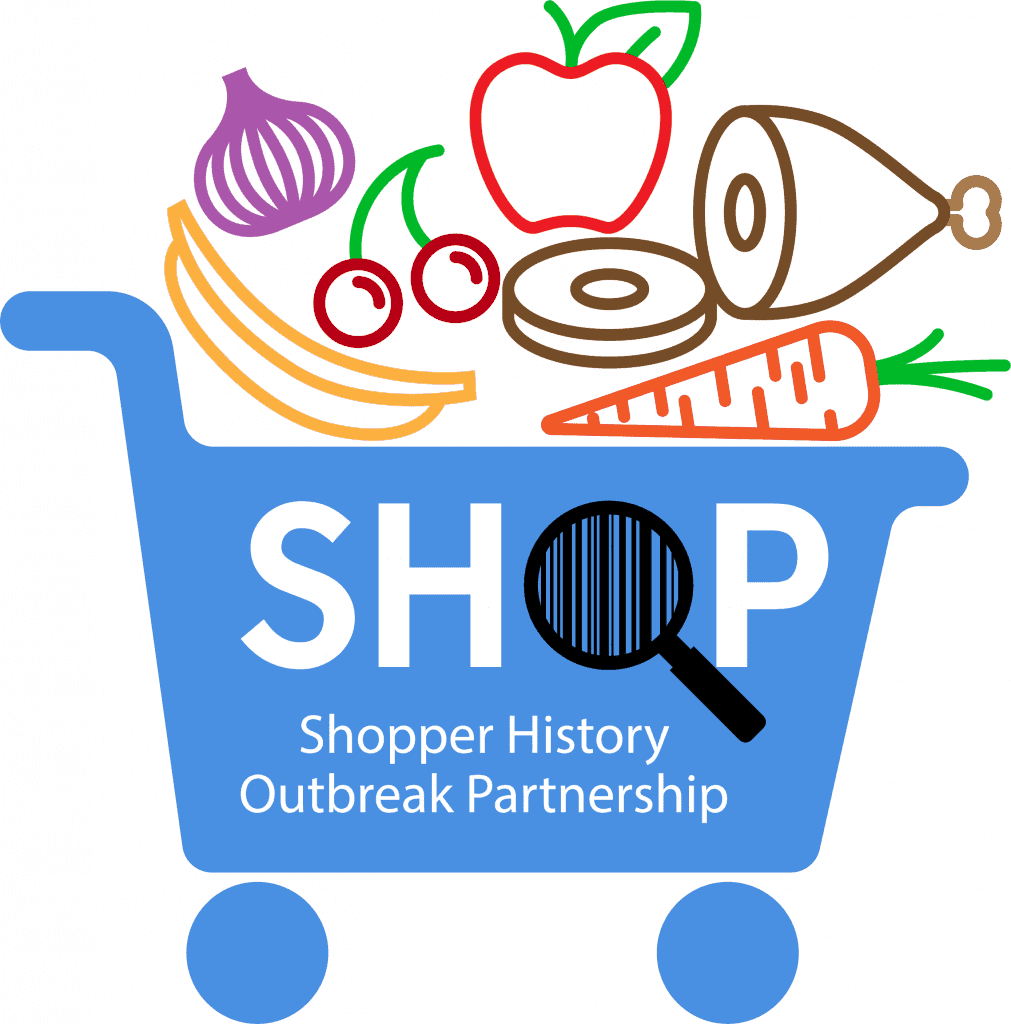Leveraging Food Purchase History to Solve Foodborne Outbreaks

The Shopper History Outbreak Partnership (SHOP) is a group of public health and food safety officials dedicated to working closely with industry partners to use consumer food purchase data as a tool to solve foodborne outbreaks, remove contaminated food from the marketplace, and prevent additional illnesses.
How Food Purchase History Protects Public Health
Best Practices for Investigators on Collection & Use of Shopper History during Foodborne Outbreak Investigations
Shopper history: best practices for use during foodborne illness investigations
Shopper history (any record that provides information about a specific shopper’s food purchases) provides an objective source of information to investigations and is an essential tool in solving outbreaks. This best practice document provides recommendations that local, state, and federal public health and regulatory officials can use when requesting and using shopper history as part of a foodborne outbreak investigation. Learning about shopper history best practices may help industry partners and consumers develop ideas for how to better collaborate with government investigators to solve outbreaks.
Success Stories
During a 2021 multistate outbreak of Salmonella I 4,[5],12:i:- illnesses associated with Italian-style meats, ill people shared the last four digits of their credit card number with public health officials who worked closely with a retailer to obtain food purchase information. This information confirmed the specific Italian-style meat product that ill people purchased. The information was also used to guide sampling and traceback activities, which led to a recall of the Italian-style meat products.
During a 2021 multistate outbreak of Salmonella Infantis and Typhimurium illnesses associated with Italian-style meats, ill people reported purchasing Italian-style meats from a retailer with a shopper card program. Ill people shared their shopper card numbers with public health officials who worked with the retailer to obtain the shopper histories. The shopper history information was used to confirm the food vehicle and trace the products back to the producing establishment.
During a 2020 multistate outbreak of 80 Salmonella illnesses from 15 states associated with produce, a retailer used its shopper card program to provide case-patient family shopper histories within 24 hours of the request, allowing our agency to identify the produce items, purchase dates, and store locations most likely linked to illness. The retailer then provided product distribution pivot tables linking stores where these products were sold with shipments and growers, allowing us to determine the most likely sources. The retailer’s novel use of these records enabled investigators to take action at the farms days earlier than ever before.
We were investigating a cluster of salmonella cases that reported consuming prepackaged salad mixes (slightly different descriptions) that were purchased from a common chain store. We received permission from cases to obtain their purchase records from the store and the company quickly produced those purchase records. The records identified a common brand and variety of salad mix, which allowed the store to immediately pull the product from store shelves and contact everyone who had purchased the product. This quick response undoubtedly helped prevent further illness.
In a 2018 multi-state outbreak of E. coli O26 illnesses associated with ground beef, three different mechanisms allowed investigators to obtain purchase data that led to identification of the ground beef source and a “supplier-level” recall. Retailer 1: this retailer established a phone line for cases to call with their credit card information which allowed the retailer to look up their purchases. Retailer 2: This retailer looked up a case’s purchases made by check using the case’s check cashing card number, which was required by the retailer for check purchased from this retailer. Retailer 3: one case provided a receipt for ground beef purchased from this retailer.
In a 2013 outbreak which sickened 165 people from 10 states with Hepatitis A, after consumption of pomegranate arils, regulatory officials were able to utilize retailer-provided membership program records to identify the implicated product, resulting in a recall. The retailer used purchase records to identify and notify 250,000 customers via automated phone calls that they had purchased the implicated product.
If you would like to share your success story on the site, please email the completed form to the Shopper History Outbreak Partnership (SHOP).
Frequently Asked Industry Questions
Regarding Consumer Purchase Data Sharing
Rapid and effective information sharing between the food industry and government officials can be a critical component to solving foodborne outbreaks. Successfully solving a foodborne outbreak requires cooperation and collaboration while also acknowledging each other’s limitations and concerns on information sharing. Below are some commonly asked questions and answers regarding sharing of consumer food purchase data. Processes and requests may vary based on different states’ regulations. It is best to work with your company’s legal counsel and the state’s regulatory authorities prior to food emergencies to determine information sharing requirements and processes.
Q1: How do I know that the consumer has consented to sharing their food purchase information with public health officials?
Most investigators will not request purchase history from industry without having already obtained permission from the consumer during the epidemiologic interview. Consumers may consent verbally over the phone during an epidemiologic interview, or in writing via paper form, email, or text. This information will be shared with the retailer upon requesting the food purchase history. It is recommended that the company’s legal department and the state agency discuss the data sharing request process before an actual event, to clarify expectations and prevent delays.
Q2: How do health officials protect privacy and maintain confidentiality?
Health officials only share information with other public health and regulatory officials and industry if it is needed for the investigation. Once the shopper history is received, the requesting agency will redact the personal information (name, phone number, shopper card number, credit card number, etc.) before sharing with any other public health or regulatory partners investigating the outbreak.
Q3: During a foodborne outbreak investigation do I need to provide information about everything a person purchased?
The timeframe of interest can vary greatly depending on the food product of interest (particularly its shelf life) and the reason for the investigation. An investigation may be initiated because of a pathogen (i.e., E. coli, Salmonella, Listeria) or other contamination (chemical or physical contaminant). The time it takes for someone to become ill after eating the product (the incubation period) will also have an effect on the date range for the shopper history request.
Q4: How do health officials determine the timeframe of interest when requesting shopper history?
The timeframe of interest can vary greatly depending on the food product of interest (particularly its shelf life) and the reason for the investigation. An investigation may be initiated because of a pathogen (i.e., E. coli, Salmonella, Listeria) or other contamination (chemical or physical contaminant). The time it takes for someone to become ill after eating the product (the incubation period) will also have an effect on the date range for the shopper history request.
Q5: Is my company required to provide consumer purchase data if we do not have a loyalty/shopper card program?
If your company can track the consumer’s purchase data through other transaction or payment records (i.e., phone number, credit/debit cards, etc.), you might be required to turn those records over if the state has legal authority to obtain them. This varies from state to state.
Q6: If a state has laws in place that allow them to obtain consumer purchase data, should our company still wait until we obtain permission directly from the consumer before releasing the information to government officials?
Industry’s decision on requiring customer permission is internal, but bear in mind that generally most investigators will not request purchase history from industry without having already obtained permission from the consumer during an interview. To prevent delays during an emergency, it is recommended that the company’s legal department and the state agency discuss the data sharing request process prior to an actual event, so expectations are clear. Industry may consider whether consumers can ‘opt-in’ during signup for loyalty/shopper cards to grant advance permission to share their data in case of an emergency.
Q7: Can we be sued/held liable for releasing consumer purchase records if the State is authorized to obtain those records?
The state statutes providing public health agencies with the authority to access records may help to reduce the risk to the retailer when they are providing records. Generally, the consumer has already granted permission to investigators during the interview. Laws within each state may vary, so it is recommended that the firm consult its legal counsel on this topic prior to an actual event. Some state citations allowing them to obtain records may be found here https://afdo.org/resources/purchase-history/
Q8: Consumers buy products from us using various online grocery delivery services. Are we still responsible for providing purchase data or does it become the responsibility of the delivery service to do so?
If your company has a record of the purchase, even if it is delivered by a third party, you would be expected to provide the information.
Q9: Why would a government agency ask for a shopper history before a suspected food item has been identified?
Food purchase history may be requested to test a hypothesis of which food item(s) may be a likely vehicle but have not yet been confirmed. Purchase histories may be compared to identify common food items between ill people who are part of an outbreak. More information about the investigation process can be found at How Food Purchase History Protects Public Health.
State Legal Authorities
During multi-jurisdictional foodborne illness outbreak investigations, government officials may have an urgent need to obtain consumer’s product purchase information from industry in order to determine common food links between ill people. Industry partners must determine how to balance these requests with any potential legal concerns related to protecting consumer privacy, which may cause a delay in providing information to investigators. As a result, some industry partners have begun asking regulators to provide references to their legal authority to obtain these records.
This website is an online resource for industry to more rapidly access available states’ legal authorities or other documentation allowing government officials to obtain information such as consumer product purchase records from the food industry for investigative purposes.
The italic states have statutory citations that can be used for obtaining consumer purchase records during investigations.
Alabama
Alaska
Arkansas
Hawaii
Idaho
Iowa
Kentucky
Louisiana
Maine
Massachusetts
Mississippi
Missouri
Montana
Nebraska
Nevada
New Jersey
New Mexico
North Carolina
North Dakota
Oklahoma
Oregon
Pennsylvania
South Carolina
South Dakota
Texas
Vermont
Virginia
West Virginia
Wyoming
